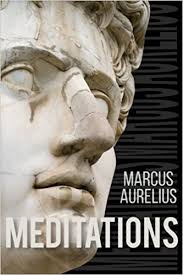Meditations Page #8
Meditations is a series of personal writings by Marcus Aurelius, Roman Emperor from 161 to 180 AD, recording his private notes to himself and ideas on Stoic philosophy. Marcus Aurelius wrote the 12 books of the Meditations in Koine Greek as a source for his own guidance and self-improvement.
XV. In the country of the Quadi at Granua, these. Betimes in the morning say to thyself, This day I shalt have to do with an idle curious man, with an unthankful man, a railer, a crafty, false, or an envious man; an unsociable uncharitable man. All these ill qualities have happened unto them, through ignorance of that which is truly good and truly bad. But I that understand the nature of that which is good, that it only is to be desired, and of that which is bad, that it only is truly odious and shameful: who know moreover, that this transgressor, whosoever he be, is my kinsman, not by the same blood and seed, but by participation of the same reason, and of the same divine particle; How can I either be hurt by any of those, since it is not in their power to make me incur anything that is truly reproachful? or angry, and ill affected towards him, who by nature is so near unto me? for we are all born to be fellow-workers, as the feet, the hands, and the eyelids; as the rows of the upper and under teeth: for such therefore to be in opposition, is against nature; and what is it to chafe at, and to be averse from, but to be in opposition? XVI. Whatsoever I am, is either flesh, or life, or that which we commonly call the mistress and overruling part of man; reason. Away with thy books, suffer not thy mind any more to be distracted, and carried to and fro; for it will not be; but as even now ready to die, think little of thy flesh: blood, bones, and a skin; a pretty piece of knit and twisted work, consisting of nerves, veins and arteries; think no more of it, than so. And as for thy life, consider what it is; a wind; not one constant wind neither, but every moment of an hour let out, and sucked in again. The third, is thy ruling part; and here consider; Thou art an old man; suffer not that excellent part to be brought in subjection, and to become slavish: suffer it not to be drawn up and down with unreasonable and unsociable lusts and motions, as it were with wires and nerves; suffer it not any more, either to repine at anything now present, or to fear and fly anything to come, which the destiny hath appointed thee. XVII. Whatsoever proceeds from the gods immediately, that any man will grant totally depends from their divine providence. As for those things that are commonly said to happen by fortune, even those must be conceived to have dependence from nature, or from that first and general connection, and concatenation of all those things, which more apparently by the divine providence are administered and brought to pass. All things flow from thence: and whatsoever it is that is, is both necessary, and conducing to the whole (part of which thou art), and whatsoever it is that is requisite and necessary for the preservation of the general, must of necessity for every particular nature, be good and behoveful. And as for the whole, it is preserved, as by the perpetual mutation and conversion of the simple elements one into another, so also by the mutation, and alteration of things mixed and compounded. Let these things suffice thee; let them be always unto thee, as thy general rules and precepts. As for thy thirst after books, away with it with all speed, that thou die not murmuring and complaining, but truly meek and well satisfied, and from thy heart thankful unto the gods. THE SECOND BOOK I. Remember how long thou hast already put off these things, and how often a certain day and hour as it were, having been set unto thee by the gods, thou hast neglected it. It is high time for thee to understand the true nature both of the world, whereof thou art a part; and of that Lord and Governor of the world, from whom, as a channel from the spring, thou thyself didst flow: and that there is but a certain limit of time appointed unto thee, which if thou shalt not make use of to calm and allay the many distempers of thy soul, it will pass away and thou with it, and never after return. II. Let it be thy earnest and incessant care as a Roman and a man to perform whatsoever it is that thou art about, with true and unfeigned gravity, natural affection, freedom and justice: and as for all other cares, and imaginations, how thou mayest ease thy mind of them. Which thou shalt do; if thou shalt go about every action as thy last action, free from all vanity, all passionate and wilful aberration from reason, and from all hypocrisy, and self-love, and dislike of those things, which by the fates or appointment of God have happened unto thee. Thou seest that those things, which for a man to hold on in a prosperous course, and to live a divine life, are requisite and necessary, are not many, for the gods will require no more of any man, that shall but keep and observe these things. III. Do, soul, do; abuse and contemn thyself; yet a while and the time for thee to respect thyself, will be at an end. Every man's happiness depends from himself, but behold thy life is almost at an end, whiles affording thyself no respect, thou dost make thy happiness to consist in the souls, and conceits of other men. IV. Why should any of these things that happen externally, so much distract thee? Give thyself leisure to learn some good thing, and cease roving and wandering to and fro. Thou must also take heed of another kind of wandering, for they are idle in their actions, who toil and labour in this life, and have no certain scope to which to direct all their motions, and desires. V. For not observing the state of another man's soul, scarce was ever any man known to be unhappy. Tell whosoever they be that intend not, and guide not by reason and discretion the motions of their own souls, they must of necessity be unhappy. VI. These things thou must always have in mind: What is the nature of the universe, and what is mine--in particular: This unto that what relation it hath: what kind of part, of what kind of universe it is: And that there is nobody that can hinder thee, but that thou mayest always both do and speak those things which are agreeable to that nature, whereof thou art a part. VII. Theophrastus, where he compares sin with sin (as after a vulgar sense such things I grant may be compared:) says well and like a philosopher, that those sins are greater which are committed through lust, than those which are committed through anger. For he that is angry seems with a kind of grief and close contraction of himself, to turn away from reason; but he that sins through lust, being overcome by pleasure, doth in his very sin bewray a more impotent, and unmanlike disposition. Well then and like a philosopher doth he say, that he of the two is the more to be condemned, that sins with pleasure, than he that sins with grief. For indeed this latter may seem first to have been wronged, and so in some manner through grief thereof to have been forced to be angry, whereas he who through lust doth commit anything, did of himself merely resolve upon that action.
Translation
Translate and read this book in other languages:
Select another language:
- - Select -
- 简体中文 (Chinese - Simplified)
- 繁體中文 (Chinese - Traditional)
- Español (Spanish)
- Esperanto (Esperanto)
- 日本語 (Japanese)
- Português (Portuguese)
- Deutsch (German)
- العربية (Arabic)
- Français (French)
- Русский (Russian)
- ಕನ್ನಡ (Kannada)
- 한국어 (Korean)
- עברית (Hebrew)
- Gaeilge (Irish)
- Українська (Ukrainian)
- اردو (Urdu)
- Magyar (Hungarian)
- मानक हिन्दी (Hindi)
- Indonesia (Indonesian)
- Italiano (Italian)
- தமிழ் (Tamil)
- Türkçe (Turkish)
- తెలుగు (Telugu)
- ภาษาไทย (Thai)
- Tiếng Việt (Vietnamese)
- Čeština (Czech)
- Polski (Polish)
- Bahasa Indonesia (Indonesian)
- Românește (Romanian)
- Nederlands (Dutch)
- Ελληνικά (Greek)
- Latinum (Latin)
- Svenska (Swedish)
- Dansk (Danish)
- Suomi (Finnish)
- فارسی (Persian)
- ייִדיש (Yiddish)
- հայերեն (Armenian)
- Norsk (Norwegian)
- English (English)
Citation
Use the citation below to add this book to your bibliography:
Style:MLAChicagoAPA
"Meditations Books." Literature.com. STANDS4 LLC, 2025. Web. 23 Feb. 2025. <https://www.literature.com/book/meditations_76>.








Discuss this Meditations book with the community:
Report Comment
We're doing our best to make sure our content is useful, accurate and safe.
If by any chance you spot an inappropriate comment while navigating through our website please use this form to let us know, and we'll take care of it shortly.
Attachment
You need to be logged in to favorite.
Log In